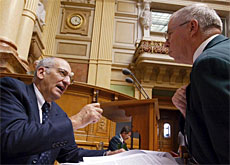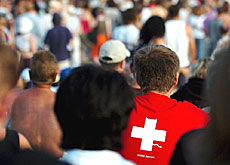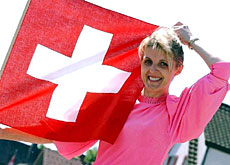People’s Party demands end to dual nationality

The rightwing People’s Party has called for legislation to prevent people holding two passports, warning it could demand a nationwide vote on the issue.
It comes after Swiss voters rejected moves to make it easier for young foreigners to become naturalised.
The People’s Party announced its intentions on September 26, shortly after the vote. Its leaders want parliament to repeal the 1992 law on dual citizenship, which allows freshly minted citizens to keep their old passports.
Previously, new Swiss had to give up their old nationality.
“You cannot serve two masters,” said Ueli Maurer, the president of the People’s Party, who does however admit that it is not a simple issue. “My wife, who was American, had to give up her passport.”
The party has had dual citizenship in its sights since it issued its current political programme in 2003. “You cannot buy Swiss citizenship, it must a real and conscious choice,” wrote its authors.
The populist movement has since said that it must keep a promise made to voters.
Parliamentary manoeuvres
In May, party representative Jasmin Hutter, with the support of 37 other parliamentarians, called on the government to repeal the law.
She believes that dual nationality should not be allowed, since it gives new citizens the best of both worlds without having to make a choice.
The government is expected to give its answer in November.
Not everybody is happy about the People’s Party’s latest manoeuvres.
“When I think of all the Swiss expatriates who have a second passport and vote here, it drives me mad,” said Jacques-Simon Eggly, joint vice-president of the Organisation of the Swiss Abroad (OSA).
“Even if the new legislation wasn’t retroactive…, it would still mean that a Swiss person moving abroad would have to cut their ties with their homeland, something I find absurd in our day and age,” he added.
Large numbers
In Switzerland alone, there are half a million people who benefit from dual citizenship, according to the last federal census in 2000.
This simple fact means that many politicians are uncomfortable with the idea of meddling with the country’s nationality laws.
Pierre-François Veillon, a People’s Party representative whose wife is a dual national, says that you have to look at the facts.
“In French-speaking cantons, especially those bordering France, there are a lot of dual citizens,” he told swissinfo.
Veillon admits his party’s initiative comes at a bad time. “I’m not against dual citizenship, and politically speaking, I think we have more important things to worry about right now,” he added.
Swiss abroad
Among the 612,000 Swiss abroad, 70 per cent have two passports, and around 90,000 vote regularly. A large majority of these voters accepted the government’s proposals to ease citizenship requirements on September 26.
Jean-Paul Aeschlimann, the other vice-president of the OSA, says that the People’s Party is making a mistake.
“Either they have forgotten about the expatriates, or they have decided to punish the Swiss abroad who don’t vote for them,” he told swissinfo.
The justice minister, Christoph Blocher, will defend the government’s position in parliament in November. Blocher, a member of the People’s Party, was personally opposed to easing citizenship requirements.
He has asked the Federal Office of Immigration, Integration and Emigration to consider what should be done about dual citizenship. So far three options are available.
Switzerland could stick with current legislation, return to the pre-1992 situation, or make dual nationals give up one of their passports.
swissinfo, Isabelle Eichenberger
Switzerland recognises dual citizenship since 1992.
Around 500,000 Swiss citizens have another passport.
57% were born in Switzerland and three quarters of them are EU citizens.
The number of Swiss expatriates has doubled in the past 30 years, reaching 612,562 in 2003.
Nearly 60% live in the EU, and over a quarter of the total in France.

In compliance with the JTI standards
More: SWI swissinfo.ch certified by the Journalism Trust Initiative











You can find an overview of ongoing debates with our journalists here . Please join us!
If you want to start a conversation about a topic raised in this article or want to report factual errors, email us at english@swissinfo.ch.